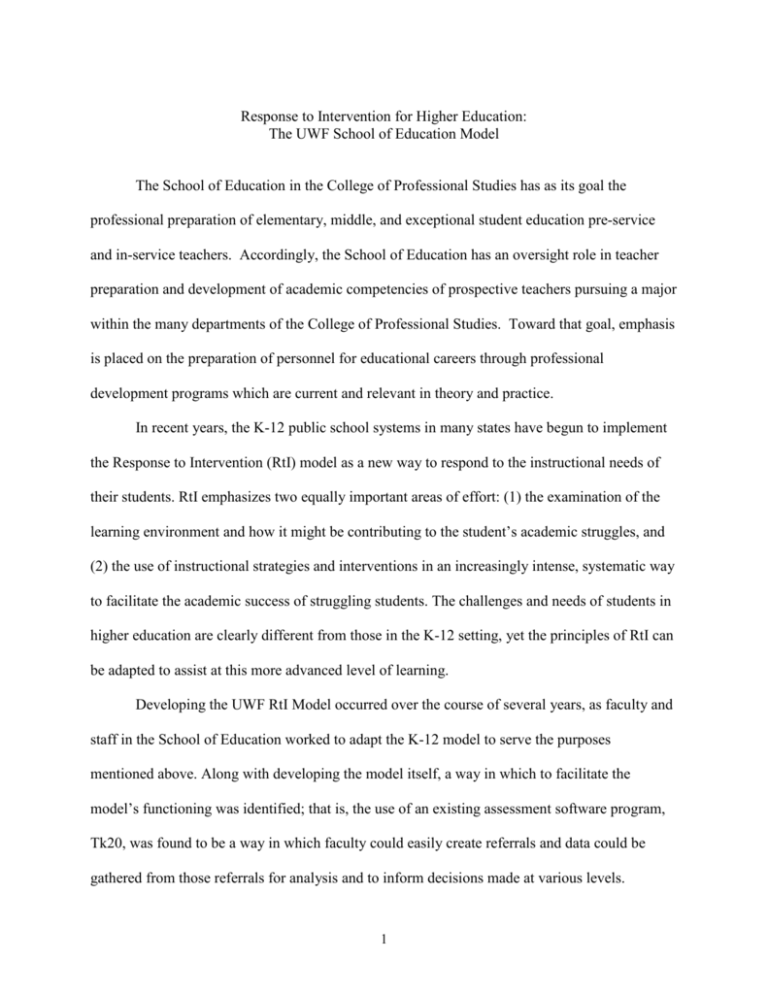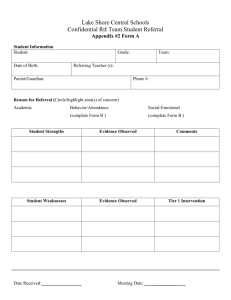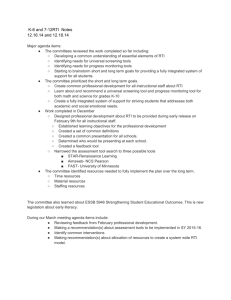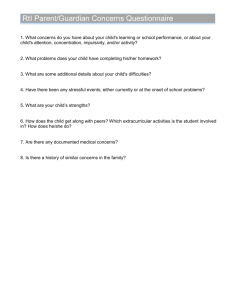Response to Intervention referral
advertisement

Response to Intervention for Higher Education: The UWF School of Education Model The School of Education in the College of Professional Studies has as its goal the professional preparation of elementary, middle, and exceptional student education pre-service and in-service teachers. Accordingly, the School of Education has an oversight role in teacher preparation and development of academic competencies of prospective teachers pursuing a major within the many departments of the College of Professional Studies. Toward that goal, emphasis is placed on the preparation of personnel for educational careers through professional development programs which are current and relevant in theory and practice. In recent years, the K-12 public school systems in many states have begun to implement the Response to Intervention (RtI) model as a new way to respond to the instructional needs of their students. RtI emphasizes two equally important areas of effort: (1) the examination of the learning environment and how it might be contributing to the student’s academic struggles, and (2) the use of instructional strategies and interventions in an increasingly intense, systematic way to facilitate the academic success of struggling students. The challenges and needs of students in higher education are clearly different from those in the K-12 setting, yet the principles of RtI can be adapted to assist at this more advanced level of learning. Developing the UWF RtI Model occurred over the course of several years, as faculty and staff in the School of Education worked to adapt the K-12 model to serve the purposes mentioned above. Along with developing the model itself, a way in which to facilitate the model’s functioning was identified; that is, the use of an existing assessment software program, Tk20, was found to be a way in which faculty could easily create referrals and data could be gathered from those referrals for analysis and to inform decisions made at various levels. 1 The School of Education defines professional development as a continuous process of improvement to promote high standards of academic achievement and responsible citizenship for all students. A goal in Teacher Education is to provide students with the tools needed to become successful teachers. The School of Education’s RtI process promotes an atmosphere of prevention and support through its tiered system, using data to improve courses, programs, and procedures and to support candidates who are struggling to meet content and disposition standards and competencies. Please refer to the RtI flowchart included as Appendix A. The RtI mediation process commences according to the following “triggers” (see the Sample Referral Form included as Appendix C): when a faculty member or advisor notes a student is having a problem with his or her course early in the semester; when the student demonstrates a need/problem in general knowledge and/or basic skills, including GPA and professionalism issues; when a faculty member or advisor notes the student lacks proficiency in subject matter content; when a student has not successfully met key assignment expectations; when a student has received less than a C-, an I, or a W in a course; when a competency in the State of Florida, Department of Education mandated Educator Accomplished Practices has not been met; when the student fails to meet dispositional expectations or the Ethical and Professional Standards of Conduct expected for the Education Profession in Florida. The faculty member/advisor notes the student’s performance need(s) and completes a referral (see Instructor Directions included as Appendix B). The student is then contacted by the 2 Director of Teacher Education Student Services (TESS) and advised to contact the instructor of the course in question in order to identify an appropriate remedy for the particular concern(s). The instructor in question is also required to perform a review to determine if there are any course and or assignment adjustments that should be considered. As RtI is a tiered process, students may expect an incremental increase in the level of remedy or intervention based on the duration and or frequency of the deficiency. At the conclusion of the semester in which the referral was created, the instructor provides information to determine whether the referral should be considered resolved or not. The data generated by the RtI process for higher education is seen as a valuable tool for program and course review and evaluation (see data tables and graphs included as Appendix D, E, F, and G). Academic advisors can use this data as one of their tools as well as they seek to find the “best fit” for students from among the many choices that there are for their academic success. Having access to the referral database allows all who interact with our students both academically and in an advising capacity to have a clearer idea of that student’s needs and areas that require improvement. As a part of the UWF School of Education’s commitment to the teaching profession, it is incumbent upon its faculty and administration to have its graduates be performing at expected levels and beyond with respect to teaching skills and dispositional domains. 3 Appendix A UWF School of Education RtI Process (rev. 3/3/11) Red Flags Submit Referral Form Yes Tier 1 Initial Investigation Compare student results with other students Contact student Contact Advisor Is this an isolated incident? Yes Instructor Addresses Problem No Instructor Determines if Systemic or Individual Systemic Individual Resolved Possible Interventions Assess the course, re-teach material, and add additional resources Not Resolved Tier 2 Support Plan developed by Support Team Student Remediation/Tutoring Interventions (e.g., meeting with student) Resources (e.g., writing lab, Disability Center on campus) Submit Referral Form Systemic Aggregated data to SoE Director Candidate Transition Point Review (TESS) Seek Consultation School of Education Director ATC CUTLA Peers UWF Support Progress Monitoring Resolved Not Resolved Submit Referral Form Tier 3 PDP Committee for Intensive Intervention Director/Associate Director of School of Education Advisor Non-Referring Faculty Student Resolved 4 COPS Academic Standards Committee Not Resolved Appendix B 1. On your home screen, select the Advisement tab. 2. Select Students on the left side of the screen. 3. Enter student name, then select search at bottom. 4. Click on student name at bottom of screen. 5. Select Notes tab. 6. Select Add New (or click on existing note to review). 7. Enter RtI as Title and select Remediation as Type of Note. 8. Scroll down to Remediation heading. 9. Complete the following: 1.1 Step 1 1.2 Step 2 1.4 Step 4 10. At bottom of screen, select Add for new or updated referral, select Cancel if simply reviewing. 11. Director of Student Services (DSS) completes 1.3 Step 3 and alerts instructor to review feedback summary. 12. DSS completes 1.5 Step 5 and indicates Resolved / Not Resolved 13. Resolved = DSS monitors student through the following semester. 14. Not Resolved = Tier 5 Appendix C RtI Referral Form Step 1 (basic information) Student Name: Instructor Name: Course: Campus: (P’cola, Online, EC) Undergrad/Grad? Step 2 (select items that apply; briefly describe the concern) Knowledge Acquisition Failure to grasp fundamental course concepts despite appropriate engagement and participation; at risk of failing Emotional Demeanor • Demonstrates inappropriate behavior for the context • External locus of control Professional Behavior • Dishonest or deceitful behavior (academic integrity, research integrity, etc.) • Fails to exercise discretion in oral/written communication • Insensitive to diversity • Unresponsive or inappropriate to instructor support, feedback, and/or interventions Preparation • Work completed with little attention to quality and/or learning • Assignments are chronically late or missing • Comes unprepared to class/on-line session (no text, class materials, hasn’t read, etc.) Participation • Inattentive in class • May distract others or disrupt learning with behaviors • Inadequate or inappropriate participation in group activities/class discussion Communication • Uses incorrect grammar in oral and/or written communications • May use slang, profanity, inappropriate vocabulary, or offensive language • Does not express ideas clearly Attendance • Exhibits a pattern of absence and/or tardiness • Fails to contact instructor to make up missed work • Sometimes disrupts class by arriving late/leaving early • Fails to comply with attendance policies described in the syllabus Brief Explanation of Concern (<200 words) Step 3 Advising summary of feedback from other instructors Step 4 Action taken by instructor after student referred to instructor via advising email (<200 words). Step 5 Progress Note(s) Resolved / Not Resolved 6 Appendix D RtI Referral Data Table Fall 2010 Major Elem ESE Mid EdSt Other Total % Course Type or Advising Online F2F Advising Total Year Sophomore Junior Senior Masters N/A Total Knowledge Acquisition 8 8 0 0 6 22 32.4 Emotional Demeanor 0 0 0 0 0 0 0 Professional Behavior 4 3 0 0 0 7 10.3 Preparation Participation Communication Attendance Advising 4 6 0 1 5 16 23.5 2 4 0 0 1 7 10.3 0 1 0 1 0 2 2.9 0 2 0 0 0 2 1.3 9 10 0 1 1 21 27.5 57.4 10.3 32.4 20 2 0 22 0 0 0 0 6 1 0 7 13 3 0 16 4 3 0 7 2 0 0 2 2 0 0 2 4.4 47.1 48.5 0 0 2 16 4 0 0 22 0 0 0 0 0 0 0 1 6 0 0 7 0 6 10 0 0 16 0 1 6 0 0 7 0 0 2 0 0 2 0 1 0 2 0 2 n 25 28 0 2 13 68 % 36.8 41.2 0 2.9 19.1 39 7 22 68 3 32 33 0 0 68 Note: A referral may be made for more than one category/trigger per student. Resolved category updated: 7/6/11 7 Resolved n 19 23 0 1 13 56 Resolved % of 56 34.0 41.0 0 1.8 23.2 0 0 21 21 33 5 18 56 58.9 8.9 32.2 1 9 11 0 0 21 2 26 28 0 0 56 3.6 46.4 50.0 0 0 Appendix E RtI Referral Data Table Spring 2011 Major Elem ESE Mid EdSt Other Total % Course Type or Advising Online F2F Student Tchg Advising Total Year Sophomore Junior Senior Masters N/A Total Emotional Demeanor 1 5 0 0 0 6 8.3 Professional Behavior 3 8 0 1 0 12 16.7 Participation Communication Attendance Advising % 36.1 44.4 1.4 5.6 12.5 100 Knowledge Acquisition 2 1 0 0 1 4 5.6 Preparation n 26 32 1 4 9 72 15 14 0 2 7 38 52.8 2 1 0 1 0 4 5.6 0 2 0 0 0 2 2.8 0 0 0 1 3 4 5.6 13 10 1 1 1 26 26.8 39 7 3 23 72 54.2 9.7 4.2 31.9 100 1 1 2 0 4 4 0 2 0 6 5 2 3 2 12 32 5 1 0 38 4 0 0 0 4 1 0 1 0 2 3 1 0 0 4 6 28 34 2 2 72 8.3 38.9 47.2 2.8 2.8 100 1 1 2 0 0 4 1 1 4 0 0 6 1 4 7 0 0 12 4 14 17 1 2 38 0 1 3 0 0 4 0 1 1 0 0 2 0 1 1 2 0 4 Note: A referral may be made for more than one category/trigger per student. 8 Resolved n 16 18 1 3 8 46 Resolved % of 46 34.8 39.1 2.2 6.5 17.4 1 2 2 21 26 24 5 0 17 46 52.1 10.9 0 37.0 1 12 13 0 0 26 2 18 22 2 2 46 4.3 39.1 48.0 4.3 4.3 Appendix F RtI Referral Data Table Cumulative* Major Elem ESE Mid EdSt Other Total % Course Type or Advising Online F2F St. Tchng Advising Total Year Sophomore Junior Senior Masters N/A Total Knowledge Acquisition 10 9 0 0 7 26 18.6 Emotional Demeanor 1 5 0 0 0 6 4.3 Professional Behavior 7 11 0 1 0 19 13.6 Preparation Participation Communication Attendance Advising 19 20 0 3 12 54 38.6 4 5 0 1 1 11 7.8 0 3 0 1 0 4 2.6 0 2 0 1 3 6 4.3 22 20 1 2 2 47 33.6 55.7 10.0 2.1 32.2 21 3 2 0 26 4 0 2 0 6 9 3 3 4 19 45 8 1 0 54 8 3 0 0 11 3 0 1 0 4 3 1 0 2 6 5.7 42.9 47.9 1.4 2.1 3 17 6 0 0 26 1 1 4 0 0 6 1 5 13 0 0 19 4 20 27 1 2 54 0 2 9 0 0 11 0 1 3 0 0 4 0 3 1 2 0 6 n 51 60 1 6 22 140 % 36.4 42.9 0.7 4.3 15.7 78 14 3 45 140 8 60 67 2 3 140 *Fall 2010 and Spring 2011 Note: one referral may have more than one indicated trigger. 9 Resolved n 35 41 1 4 21 102 Resolved % of 102 34.3 40.2 1.0 3.9 20.6 1 3 2 41 47 57 10 0 35 102 55.9 9.8 0 34.3 2 21 24 0 0 47 4 44 50 2 2 102 3.9 43.1 49.0 2.0 2.0 Appendix G RtI Graphs 10 11 12 13


